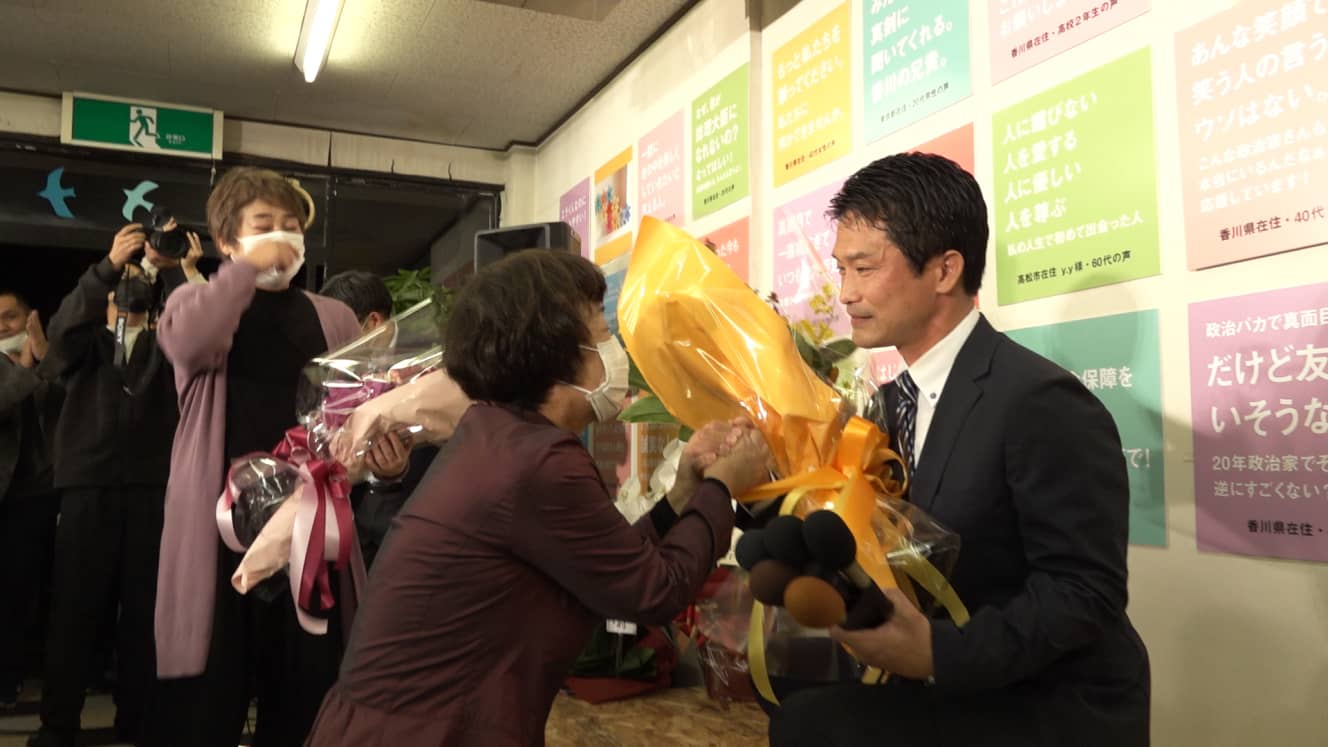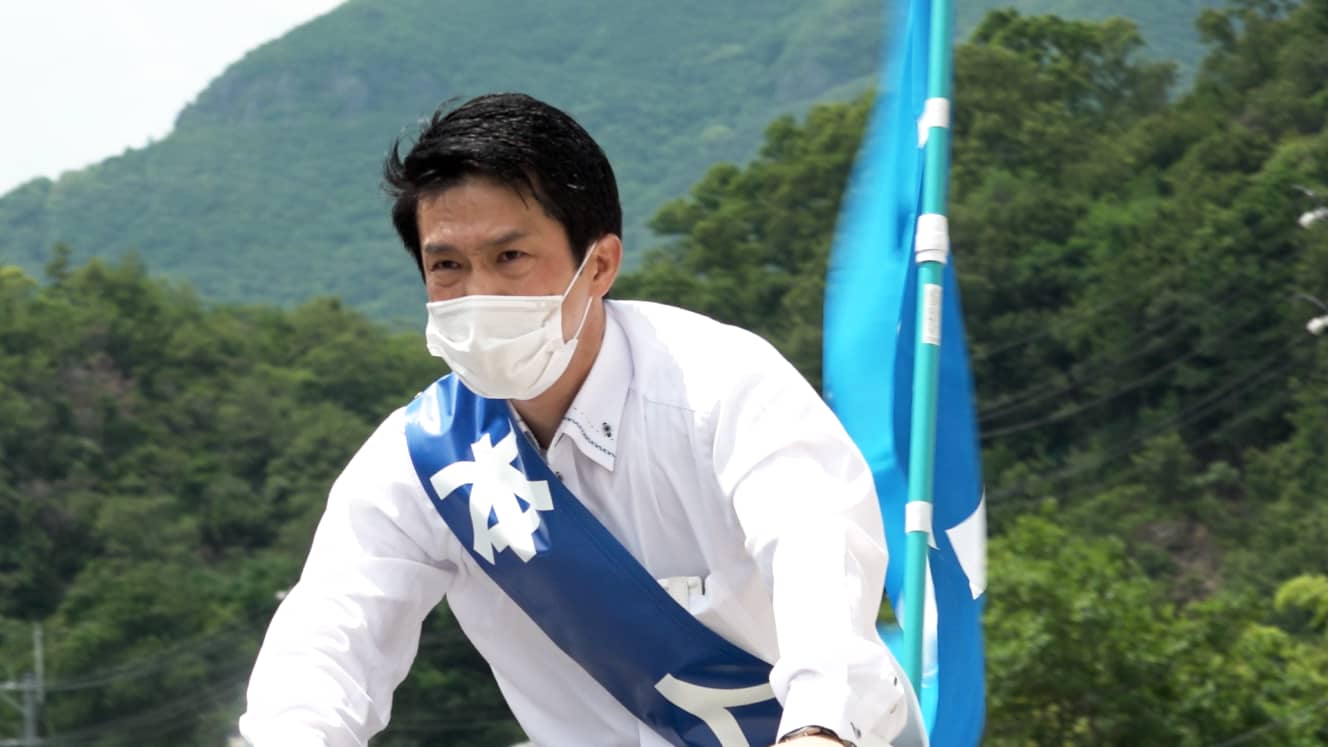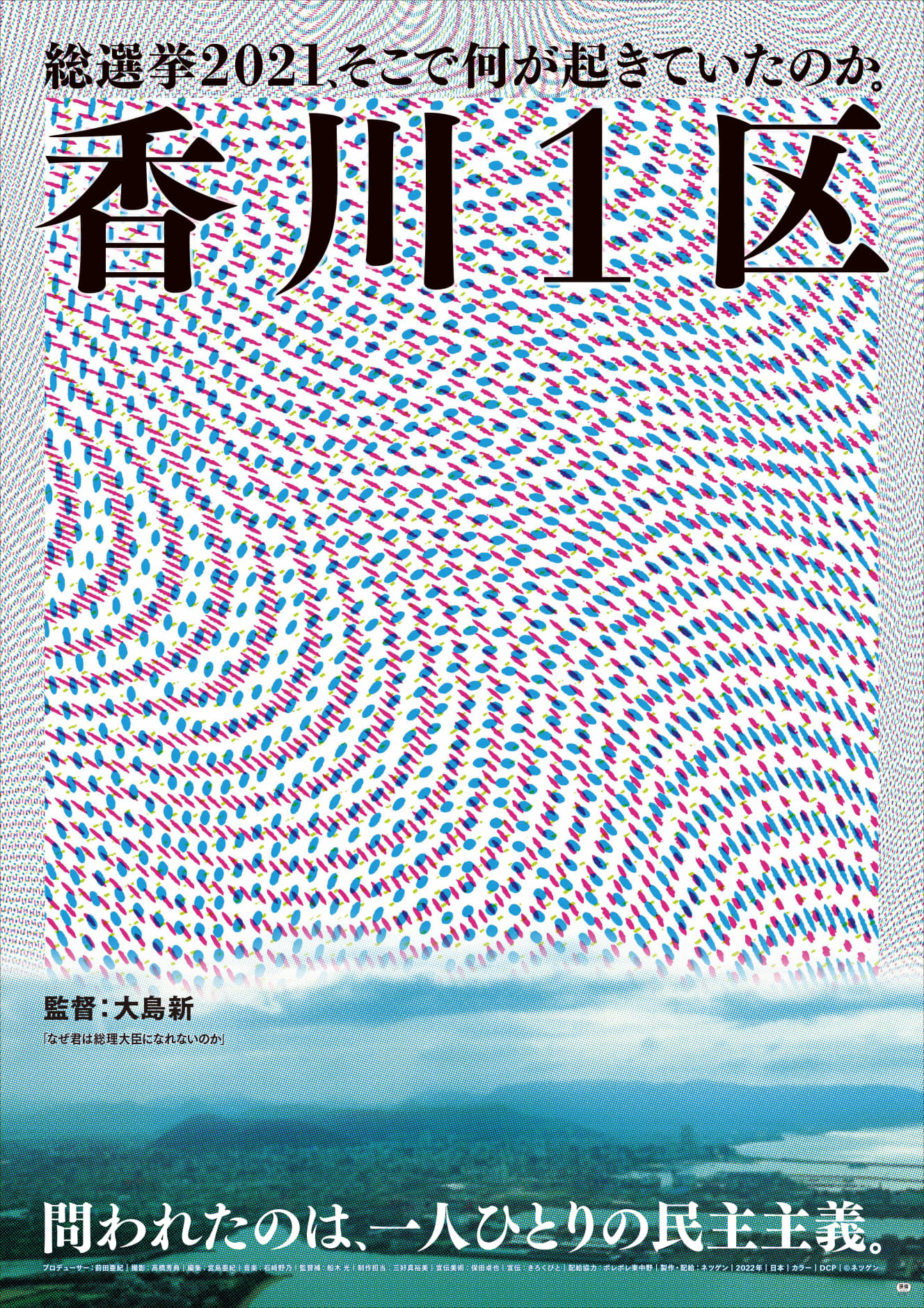Behind the Election of Senator Ogawa… Shock after shock shown in the film “Kagawa Ward 1
Interview with Director Arata Oshima
What is the shocking scoop revealed in the sequel to “Why You?
Why You Can’t Be Prime Minister” (a.k.a. “Why You?”) was an unprecedented hit for a documentary film.
A “spin-off” of the film, “Kagawa Ward 1,” directed by Arata Oshima, which follows Junya Ogawa, a member of the House of Representatives, for 17 years, has been in theaters since December 24.
Kagawa’s 1st district is an electoral district that is attracting nationwide attention, where the first Minister of Digital Affairs, Takuya Hirai (LDP), and Junya Ogawa (Rikken Democratic Party) are battling it out.
Our website interviewed the new director Oshima during the filming period (see previous article), and it is a well-known fact that Ogawa won an overwhelming victory in Kagawa’s 1st district. In other words, it was supposed to be a film to be watched with the “result” known.
I thought it was going to be a moving story of Ogawa’s victory over his powerful opponent Hirai (of course, that is one of the important factors), but when I opened the film, there were a number of “hidden gems” that made the audience cringe. The two-and-a-half-hour long film seemed to fly by in the blink of an eye. We interviewed Director Oshima to find out how he went about his research.

The following contains spoilers, so please be careful if you haven’t seen it yet.
From a mature response to a negative campaign
The main protagonists of “Kagawa Ward 1” are the “voters” of Kagawa Ward 1, and at the same time, the main protagonist behind the scenes appears to be “Why You” who caused all sorts of excitement and confusion, such as the enthusiasm of the Ogawa camp and the caution of the Hirai camp.
The decisive difference between this film and the previous one was that this time we ourselves, who had been the interviewers and the recorders, became the parties concerned, and in a sense, the performers as well, caught up in the confusion of the scene.
Mr. Ogawa’s name recognition increased with the release of the film, and this time, young people and people from outside the prefecture joined the Ogawa camp, saying they wanted to support him, and there was a lot of enthusiasm. Many people who had been supporting Mr. Ogawa for a long time said, ‘Thanks to the film,’ which made me feel a bit embarrassed (laughs).
(laughs) But on the other hand, when I went to the Hirai camp, they said, ‘Because of the film.
(laughs) But on the other hand, when I went to the Hirai camp, they would say, ‘Because of the film.’ If the world changes for the better because of my work, that would make me happy. Even if it didn’t move the whole country, it definitely had a real impact on the political situation in Kagawa’s 1st district, so I had mixed feelings about how I should take it.
New director Oshima explains his feelings.
The contrast in color and temperature between the Ogawa and Hirai camps in the film is so clear that it seems almost fictional.
The contrast between the two camps is so clear that it seems almost fictional.
In particular, during the campaigning ceremony on the day of the announcement, there is a cut in the back shot of Mr. Hirai’s campaign where everyone raises their fists and says, ‘Ganbaro! In the background shot of Mr. Hirai’s campaign, in particular, there is a cut where everyone raises their fists and says “Ganbaro!” In just a few seconds, you can see the symbolic atmosphere of the LDP election. In contrast, Mr. Ogawa’s camp was decorated with young people and other colorful decorations.
But on the other hand, if I depicted this development in fiction, I think it would be too goofy to work (laughs).”
When Director Oshima interviewed Mr. Hirai in August, he said, “He was very mature and I felt he had a lot of leeway,” but in October, when the Kan administration was replaced by the Kishida administration and Mr. Hirai was no longer the Minister of the Digital Agency, his response began to change.
In his street speeches, at first he talked about his own achievements in the Digital Agency, but halfway through his speeches, he changed his tone to ‘Is the Rikken Kyosei Party good enough? Toward the end of the film, a negative campaign began, involving the film (Why you?): “That was a PR film. Is that allowed?


The appearance of an “accuser”…
One of the “hidden gems” in the film is a scene about Mr. Hirai’s political fund party. The request is for a company in Takamatsu City to buy party tickets for 10 people at 20,000 yen each, but the company also requests that only three people attend the party, so the remaining seven people would have to be donated.
When the accuser found out that I was the director of Why You, he contacted me. ‘I thought this might be a legal issue, but it might get lost in the local media. I thought Mr. Oshima might be able to come up with some way to announce it.
But when I heard about it, I couldn’t believe it either. Even though I was working on a documentary, I wasn’t usually in the business of investigative journalism, so I asked if there was any kind of evidence, and they showed me the paper, but I didn’t know what it meant at first.
So, I asked for advice from a reporter with contacts, and consulted with Professor Hiroyuki Uewaki of Kobe Gakuin University, who is an expert on political finance issues, and the lawyer who supervised the film.
Mr. Kamiwaki also said, ‘I knew something like this would happen somewhere, but I was surprised to see such a blatant request in writing, and if this is not the story of one company, but a pile of them, it would be a big problem.
In order to proceed more cautiously, we also sent a letter of inquiry to Hirai’s office.
It was something that required a lot of determination, but the person who made the accusation told me that he felt compelled to do so, saying, ‘I’m usually looking for half-price stickers at the supermarket, so I wondered why they were doing this.

Voting before the deadline…
Another thing that is shown is the “suspicion about voting before the deadline. In the film, we see people who are supposed to have voted for Mr. Hirai at the behest of his company being sucked into the building, and we see direct interviews with people coming out of the building.
After receiving information from a certain source, we conducted our own investigation and found out that such corporate and group elections were being held, which gave us a sense of the ‘darkness of the LDP elections.
I talked to a reporter about this, but it seems that unless there is coercion or power harassment that can be verified, it is difficult to incriminate someone.
It would have been nice if we could have gotten some solid evidence, such as an e-mail with specific instructions, but we didn’t have any, so another staff member, whose face was not revealed, entered the room, and I decided to talk directly to the person who came out of the building. According to the staff member who went inside, there was an ordinary office desk in the room with a place to write your name, address, company name, and phone number.
(laughs) I thought that this was democracy, and I realized that this is exactly what Mr. Yoshiro Mori meant when he once said, “Let the independents sleep. The lower the voter turnout, the more the organizational votes of corporations and other organizations will come into play.
Oshima also mentions that invitations to join the LDP are circulated like a circular board, but he adds that this is probably the norm in many areas.
When I asked the people of Shodoshima who were going to vote for Mr. Hirai why they didn’t vote for Mr. Ogawa, they said matter-of-factly, ‘Because I wasn’t asked to.
When I asked why Mr. Ogawa wasn’t involved, he said matter-of-factly, “Because I wasn’t asked. This is one of the strengths of the LDP, which is rooted in the local community, and I was reminded once again of how difficult it is to defeat someone like Mr. Hirai, who has a lot of ground to cover and a lot of signs.
However, even among those people, there are people who are like hidden Christians. Also, Mr. Hirai was involved in a scandal that was reported by a weekly magazine, but when I asked him if he was not bothered by it, many people said, “It’s not so much Mr. Hirai, but the LDP,” whereas with Mr. Ogawa, many people said, “I like Mr. Ogawa, but I don’t like Rikken.
There was also a sharp contrast in whether it was people over party or party over people.
Even more shocking is the footage of producer Aki Maeda of “Why You” and “Kagawa Ward 1” interviewing the Hirai campaign on her own.
“A thug-like person appeared on the stage. I’m just guessing, but it’s possible that he acted that way because Maeda is a woman. If that’s the case, I’d like to say don’t underestimate her. I trust Maeda because he is a veteran journalist, and he did a good job, making the scene very memorable.
In “Why You”, which was very well received, people were divided into those who said “I cried”, “I was moved”, and “I had hope”, and those who said “I despaired at the way the election was held, where such a straightforward person could not win”.
This time, too, there is a kind of hope and a kind of despair, but I chose the blue sky dialogue meeting in Yurakucho as the last scene because I thought, ‘There’s more to come, and there’s more to come, not only in Kagawa Ward 1 but all over Japan.
It was the enthusiasm of the voters that helped Mr. Ogawa win this time, and the people who went to the polls on the day before the deadline to cast their votes were also the same voters. Each person is anonymous, but I think I was able to portray the various types of voters in this film, and I think the film shows how elections expose people.

For “Why did “Why you” director Arata Oshima start filming a sequel now?
Reporting and writing: Wakako Tago
Born in 1973. Worked at a publishing company and an advertising production company before becoming a freelance writer. In addition to interviewing actors and actresses for weekly and monthly magazines, she writes drama columns for a variety of media. JUMP 9 no Tobira ga Openitoki" (both published by Earl's Publishing).